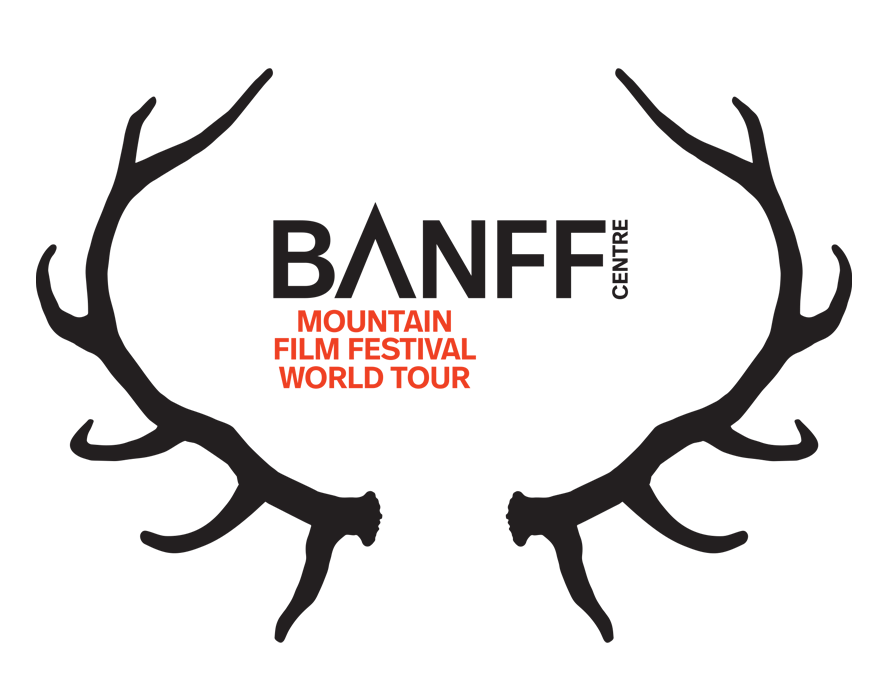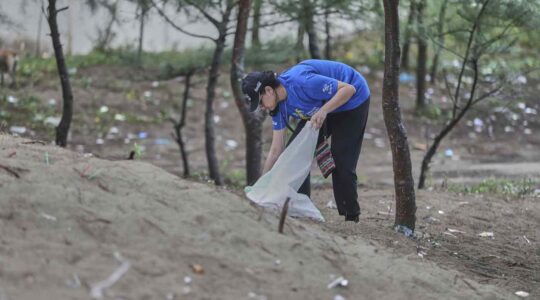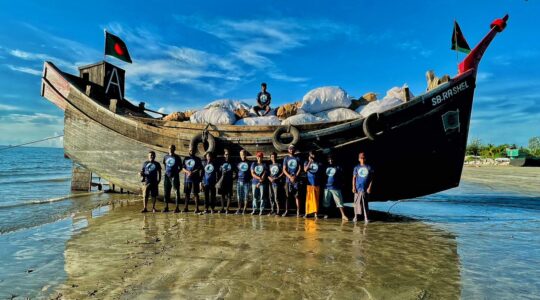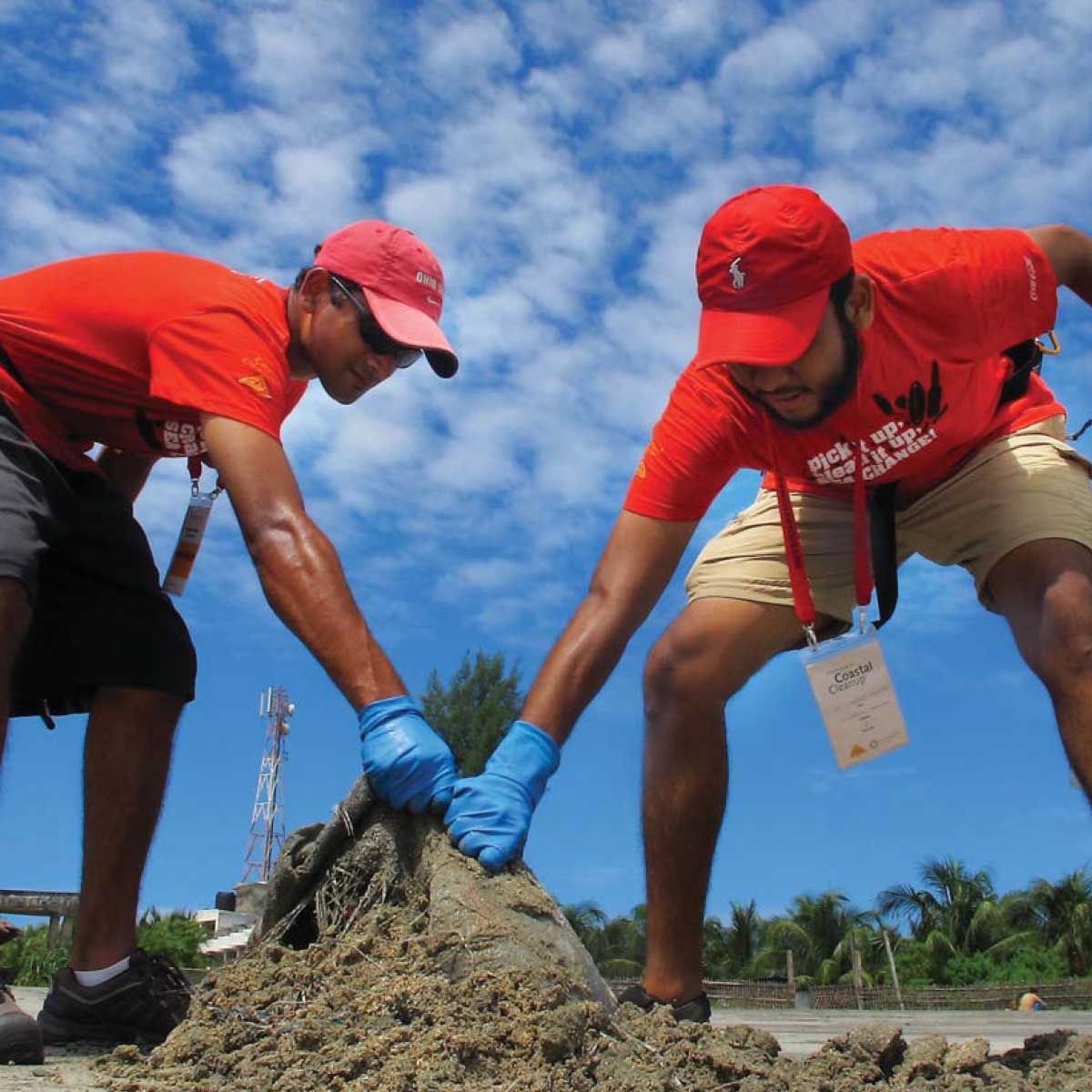
International Coastal Cleanup | 2011
International Coast Cleanup, the world’s largest volunteer effort to help protect our ocean, lakes and rivers. Each year, hundreds of thousands of volunteers from around the world spend a few hours removing trash and debris from beaches, lakes, and rivers keeping track of every piece of trash they find. Ocean Conservancy uses that information to produce an annual snapshot of the problem of marine debris.
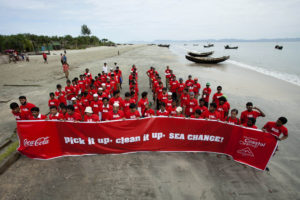 OVER THE PAST 25 YEARS, Ocean Conservancy’s International Coastal Cleanup has developed the world’s largest volunteer effort for ocean health. Almost nine million volunteers from 152 countries and locations have cleaned 145 million pounds of trash from the shores of lakes, streams, rivers, and the ocean on just one day each year.They have chronicled every item found, giving us a clear picture of the factory-made items impacting the health of humans, wildlife, and economies. Report proves, the body of data from the International Coastal Cleanup has inspired action to rid the ocean of harmful trash.All year long, officialdoms and individuals across the globe take part in Ocean Conservancy’s International Coastal Cleanup to remove trash and debris from the world’s beaches and waterways, identify the sources of that debris, and change the behaviors that allow it to reach the ocean in the first place.
OVER THE PAST 25 YEARS, Ocean Conservancy’s International Coastal Cleanup has developed the world’s largest volunteer effort for ocean health. Almost nine million volunteers from 152 countries and locations have cleaned 145 million pounds of trash from the shores of lakes, streams, rivers, and the ocean on just one day each year.They have chronicled every item found, giving us a clear picture of the factory-made items impacting the health of humans, wildlife, and economies. Report proves, the body of data from the International Coastal Cleanup has inspired action to rid the ocean of harmful trash.All year long, officialdoms and individuals across the globe take part in Ocean Conservancy’s International Coastal Cleanup to remove trash and debris from the world’s beaches and waterways, identify the sources of that debris, and change the behaviors that allow it to reach the ocean in the first place.
During the astonishing moniker event each September, hundreds of thousands of volunteers from countries all over the world spend a day picking up everything from cigarette butts and food wrappers to lost fishing nets and major appliances. Subsequently trash travels to the ocean by way of storm drains and 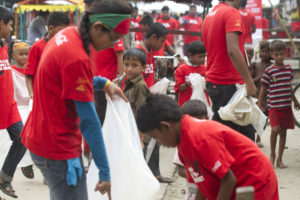 waterways, they don’t just work along ocean beaches; these dedicated folks slog through mud and sand along lakes, streams, and rivers, too, often working far inland.Many walk, while others set out on boats. Thousands more don scuba gear to seek trash below the water’s surface. People of all ages, from any walk of life, can participate. Friends, families, neighbors, club members, grade school classes—all kinds of people turn out on one day to work together in spirit across many time zones. Each year on the third Saturday in September, hundreds of thousands of volunteers comb lakes, rivers, and beaches around the world for litter. They are at the heart of the International Coastal Cleanup. Last year, nearly half-a-million people from 108 countries and locations and 45 US states removed 7.4 million pounds of trash from waterways. Kewkradong Bangladesh organizing countries largest voluntary cleanup since 2006 as a country coordinator of The Ocean Conservancy.Ocean Conservancy is the world’s leading advocate for the oceans.
waterways, they don’t just work along ocean beaches; these dedicated folks slog through mud and sand along lakes, streams, and rivers, too, often working far inland.Many walk, while others set out on boats. Thousands more don scuba gear to seek trash below the water’s surface. People of all ages, from any walk of life, can participate. Friends, families, neighbors, club members, grade school classes—all kinds of people turn out on one day to work together in spirit across many time zones. Each year on the third Saturday in September, hundreds of thousands of volunteers comb lakes, rivers, and beaches around the world for litter. They are at the heart of the International Coastal Cleanup. Last year, nearly half-a-million people from 108 countries and locations and 45 US states removed 7.4 million pounds of trash from waterways. Kewkradong Bangladesh organizing countries largest voluntary cleanup since 2006 as a country coordinator of The Ocean Conservancy.Ocean Conservancy is the world’s leading advocate for the oceans.
Through science-based advocacy, research, and public education, we inform, inspire and empower people to speak and act for the oceans. Ocean Conservancy is headquartered in Washington, DC, and has offices in Florida, the Gulf of Mexico, and the Pacific, with support from more than half a million members and volunteers.Contaminating the Environment Humans is able to control nature unlike any other creature here on earth. We are the smartest of all the animals on this planet. This is why we are able to control most of the good or bad effects that happen here on earth. However, we do not always do what is best for the environment.
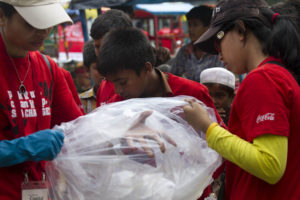 Every year people and animals die from us polluting the earth. Chemicals are becoming one of the main problems with controlling the environment. Humans’ spray poisons on the land we live on and expect that nothing wrong will happen. These poisons eventually end up in our water we drink or shower in. There are many chemicals that cause harm to our environment. “Strontium 90, released through nuclear explosions into the air comes to earth in rain or drifts down as fallout and embeds itself in the soil where it enters into the grass or corn and eventually finds its way into the bones of human beings to remain there until death.”Pollution is the introduction of contaminants into a natural environment that causes instability, disorder, harm or discomfort to the ecosystem i.e. physical systems or living organisms. Pollution can take the form of chemical substances or energy, such as noise, heat or light. Pollutants, the elements of pollution, can be foreign substances or energies or naturally occurring; when naturally occurring, they are considered contaminants when they exceed natural levels.
Every year people and animals die from us polluting the earth. Chemicals are becoming one of the main problems with controlling the environment. Humans’ spray poisons on the land we live on and expect that nothing wrong will happen. These poisons eventually end up in our water we drink or shower in. There are many chemicals that cause harm to our environment. “Strontium 90, released through nuclear explosions into the air comes to earth in rain or drifts down as fallout and embeds itself in the soil where it enters into the grass or corn and eventually finds its way into the bones of human beings to remain there until death.”Pollution is the introduction of contaminants into a natural environment that causes instability, disorder, harm or discomfort to the ecosystem i.e. physical systems or living organisms. Pollution can take the form of chemical substances or energy, such as noise, heat or light. Pollutants, the elements of pollution, can be foreign substances or energies or naturally occurring; when naturally occurring, they are considered contaminants when they exceed natural levels.
Pollution is often classed as point source or nonpoint source pollutionRole in international coastal cleanup is I will help in cleaning the society. It’s really an honor for me to take part in this noble cause. It will grant me tremendous self actually actualization.
15 October 2011

